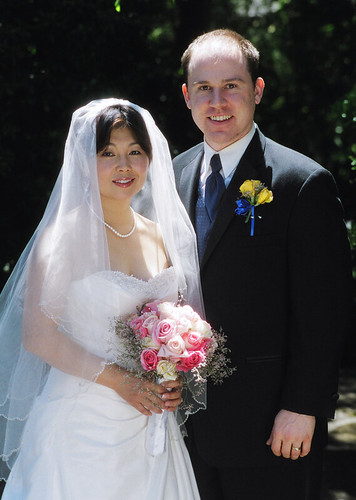Tuesday, June 30, 2009
Monday, June 29, 2009
For George's Privacy
Google Streetview's facial recognition software blurred out George Washington's silhouette on the SR 599 road sign!
. . . And just so you know, this is where the short freeway suddenly changes numbers crossing International Boulevard in Tukwila. (We drove home this way last night because there was an accident on I-5 just north of the I-5/599 junction that didn't clear out till 11:30, according to WSDOT's traffic archive.)
Posted by Sotosoroto at 14:54 0 comments
The Coup Was Not a Coup
The Honduran president was arrested on court order for breaking the law. I am glad that the rule of law prevailed and one of our southern neighbors did not delve into tyranny.
Posted by Sotosoroto at 09:04 1 comments
Index: latinamerica, news
Sunday, June 28, 2009
Too Many Mosquitos!!
We took a hike yesterday to Merritt Lake, out past Stevens Pass.
While going up the steep hill, Chunlin asked, "Why do we do this to ourselves?"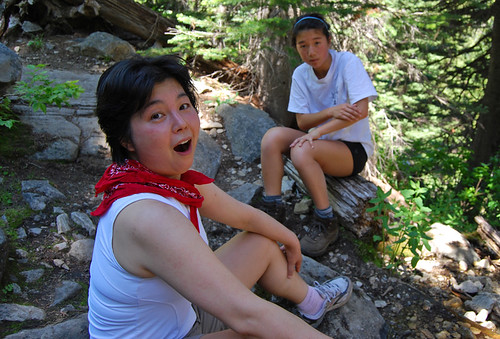
While running away from the horde of mosquitos at the lake, I asked, "Why do we do this to ourselves?"
I had expected a pleasant, relaxing lunch and swim at the lake, but it wasn't to be. We only spent about enough time at the lake for me to take three photographs and get out a sandwich to eat while hiking back down the trail. We did pause at a viewpoint about halfway down, however. The mosquitos found us there, too, but there weren't as many.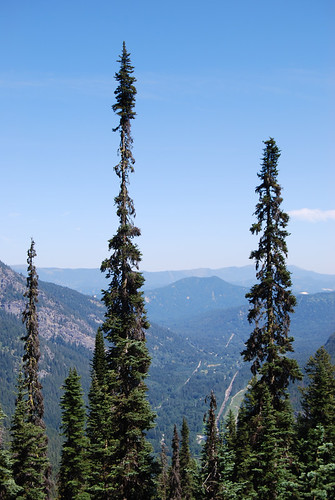
A word of warning: Don't venture above 4,000' or you won't want to sit, stop walking, or even slow down in the slightest in fear of the massive swarms of hungry biters!
Posted by Sotosoroto at 15:53 1 comments
The Tale of Píríuso

Today is the Holy Day of Píríuso, the Eye of the Sun, the Radiant One, the most beautiful and glorious god of Them all.
Praise be to Him!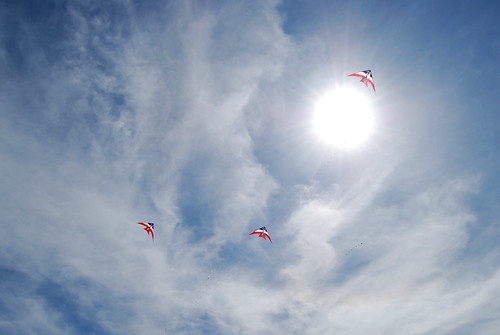

Look up during the day and you shall see glorious Píríuso high above, guiding the sun across the sky in His golden-winged chariot. Do not stare at the sun, or you will be blinded by Píríuso’s magnificent beauty. If you listen carefully, however, you can hear the handsome sun god singing and playing His harp in a most melodious and perfect way. The most splendid Píríuso is the greatest musician of all time, as well as the supreme master of poetry, healing, archery, painting, plowing, and an endless variety of other skills. Everybody loves Píríuso, for He is perfect in every way.
When Píríuso first ascended into the sky, carrying the sun in His golden chariot, it was a wonderful day for everyone in the universe. He brought light to all the world, letting everyone bask in His magnificence. Along with Him in the chariot rode His pet beetle, a junebug, who flew around the sun god, keeping Him company.
While riding across the sky, marvelous Píríuso watched the birds flit to and fro, and decided to hone His archery skills. He took aim at a passing swan and loosed an arrow. The first shot pierced the bird, whereupon the swan was so grateful to be Píríuso’s target that it flew to His chariot before dying. Thus the Radiant One retrieved the bird as well as His arrow. Píríuso then cooked the swan by holding it close to the sun for a few moments. As the day progressed, marvelous Píríuso continued His archery practice in this manner.
In the evening, glorious Píríuso guided the sun down over the western horizon, straight into the mouth of ancient and beautiful Rana, Goddess of Clouds, Who lay in waiting. Píríuso’s junebug flittered with terror, but Píríuso did not hesitate or retreat. As darkness overcame the world behind Him, brilliant Píríuso charged ahead into Rana’s innards. Rana was one of the old gods, Who did not appreciate the superb brightness that Píríuso brought to the world, and thus She wanted to stop Him.
Lit by the sun on Píríuso’s chariot, Rana’s insides were a series of moist, reddish tunnels. Píríuso guided His horses down the largest path, which after an hour abruptly ended at a giant gate. He tugged on the reins just as a five-headed demon materialized from a hole in the tunnel floor. The demon roared at the golden god and charged. With divine deftness, Píríuso leveled His bow and shot the demon with an arrow through its chest. Píríuso’s junebug fluttered his wings with excitement. The Radiant One then rode past the dead demon and opened the gate, exposing more tunnel.
After an hour of riding, Píríuso arrived at another gate, guarded by a fiercer monster, which had claws the length of Píríuso’s legs. The Golden One filled it full of arrows, but the monster did not die, for the arrows did not penetrate deep enough into its thick hide. Enraged, the monster leapt onto Píríuso’s chariot, whereupon the sun god drew His sword and, with His full might, stabbed the beast in its belly. The monster howled in pain, but Píríuso ended that by quickly eviscerated the beast, kicking it to the tunnel floor.
The second gate opened and revealed more tunnels. As the beetle flew cautiously ahead, Píríuso wiped His blade clean and proceeded deeper into Rana’s body. In total, Píríuso defeated fourteen monsters, each successively stronger, and opened fourteen gates, one for each hour of the night. The final gate opened into Rana’s birth canal, so Píríuso led the sun out the passage and into the open, riding His chariot at top speed. Thus a new day began, with glorious Píríuso rising higher and higher into the sky above the eastern horizon.
The next evening, after the other gods had heard of His adventure, many wanted to join Him on his nighttime ride through the gates. Zhoro, God of Heat, was the first to accompany the sun god, fighting mightily at His side. To this day, Zhoro still joins magnificent Píríuso the most often, but others such as Huro, God of Thunder, and Rékaré, God of Rock, also test Their mettle often against the demons of Rana’s innards. Píríuso’s junebug always joins Them, cheering Their accomplishments with a fluttering of his iridescent wings.
During the day, as He rode His golden-winged chariot across the sky, Píríuso would play His harp for the enjoyment of His fellow gods, His pet junebug, and everyone far below. With just a few plucks of the strings, the Eye of the Sun could bring tears to your eyes, or lift your spirits to the heavens, or enliven you to action. Everyone agreed that Píríuso was the best musician in all the universe.
While soaring high above the world, Píríuso spotted a young woman far below who took His breath away. Leaving the chariot and the sun in the care of Zhoro and the junebug, Píríuso descended to the earth and introduced Himself. The beautiful woman was at once enamored by the Radiant One, for He was handsome, virile, and strong; many women desired Him, yet He had been waiting the day He met His true love. For magnificent Píríuso, that day had come. Her name was Kohívísí and she was the daughter of the King of Volosího. Kohívísí fell into His arms and their romance began.
Quite often, He would take Kohívísí in His chariot during the day, dropping her off in Volosího before descending into Rana’s mouth at sunset. They always had a difficult time separating, but they knew it was safer that way, for He had demons to fight. The King of Volosího did not like his daughter being away from home so often, but agreed that a god such as Píríuso would be a most wonderful son-in-law. The golden god and the young maiden became engaged to be wed and so their splendid romance continued.
Around the same time, in a forest far away from Volosího, a Séhala demigod named Narasíhoso discovered a flute which Vítí, Goddess of Ice, had discarded. Narasíhoso learned to play the flute and became quite proficient. All the Séhala demigods and demigoddesses loved to listen to Narasíhoso play by Their bonfire, and They complimented Him extensively. Since Narasíhoso was, by nature, vain, He soon considered Himself to be the best musician in the universe.
Glorious Píríuso knew Himself to be the best, so He didn’t pay much heed to Narasíhoso’s boastings. Narasíhoso the Séhala, on the other hand, felt the need to prove Himself. The demigod challenged magnificent Píríuso to a musical duel. They would each play one song on the instrument of Their choice, to be judged by an array of goddesses. The loser would be at the complete mercy of the winner.
Unable to deny a challenge, even though He knew He would win, Píríuso accepted the contest as described by Narasíhoso. The Radiant One handed over the chariot’s reins to Zhoro and descended to the earth for the competition. In a large, grassy valley, countless gods and demigods encircled the stage built for this purpose. Seated to one side of the stage were Kara, Goddess of Soil -- an ancient mother Who resembled a jointed octopus; Rívorí, Goddess of Wildfire -- a quick-tempered warrior with red skin; Hívuítoví, Goddess of Rain -- a winged beauty with great foresight; and Tarénara, Goddess of Hunting -- the sister of Píríuso and Lady of the Moon. Tarénara tended to despise men and all they did, so having to choose between two would be especially difficult for Her. Beautiful mortal Kohívísí sat quietly at the edge of the stage, quite impressed and overwhelmed by the crowd of divinity.
Narasíhoso was the first to play. He lifted His flute and the assemblage quieted. Softly, a melody crept through the valley. As the notes soared higher, dancing an intricate line, the hearts of everyone in the crowd soared with them. Narasíhoso swayed back and forth as He played, His eyes closed. All the gods and demigods were enthralled. When His song ended, everyone was still in reverie, letting the final hint of a glimmer of a note fade out on the wind. At last, they erupted in applause and cheering, for they had never heard such beautiful flustistry. The goddess judges, however, remained subdued, reserving Themselves until They had heard both songs.
Píríuso stepped to the center of the stage with His golden harp and the crowd grew silent once more. He gave a slight bow to the judges, then began to play. Immediately, the audience became enraptured in His music. To put it shortly, Píríuso’s song was much better than Narasíhoso’s. Píríuso was, after all, a god and the best musician in the universe. Narasíhoso never stood a chance. When Píríuso finished, holding the harp aloft in one hand to let the final notes reverberate across the land, He gave a deep bow and the audience applauded and cheered for an hour straight. Kohívísí ran to His side and He gave her a marvelous kiss which only caused the audience to cheer more wildly.
At length, after the assembled gods and demigods quieted down, the goddess judges gave Their pronouncements. Kara, the mother goddess, stood high on Her eight legs and declared Her vote for the sun god. Next, Rívorí whipped out Her sword, stabbed it at the sky, and exclaimed Píríuso’s name. The rain goddess, Hívuítoví, deferred to Tarénara, letting Her speak ahead of Her. The Lady of the Moon thanked Hívuítoví and took a step forward. She sneered at each of the men in turn, unable to see past Their sex to Their skill. After a moment of collective breath-holding, She cast Her vote for the Séhala flutist. Narasíhoso grinned. Tarénara turned up Her nose in disgust.
The winged rain goddess took center stage and without much ado, She proclaimed the winner to be the Radiant One, the Eye of the Sun, glorious Píríuso. All the gods and demigods, goddesses and demigoddesses in the valley -- excepting Tarénara and the Séhalas -- burst into applause that lasted another hour. During the cheering, Narasíhoso walked meekly to Píríuso, since He was now, by His own rules, at the sun god’s mercy. To punish the demigod for His insolence and vanity, Píríuso declared that Narasíhoso should be flayed alive. The red Rívorí was more than eager to help and started the task promptly, right on stage.
Narasíhoso stood upright through the flaying, not flinching in the slightest as His skin was removed. His tears, however, flowed freely. Mixed with His streaming blood, the tears formed a river that surged down the valley toward the sea. To this day, that river remains, running red for the length of its course. Narasíhoso’s fellow Séhalas named the river in His honor and visit its headwaters once a year to pay homage at the site where His body was returned to the earth.
The day after the contest, Tarénara and Rana discussed Píríuso in most conspiratorial tones. Neither appreciated His talents and both had a desire to hurt Him dearly. Before sunset, They decided on a course of action that would indeed cause Píríuso harm and change His fate inexorably. Beyond Rana’s desire for a lack of sunshine, She also thought Herself quite attractive and thus was unable to understand why Píríuso would desire a mortal woman ahead of Her. Instead of making the sun god fall in love with Her, however, that night while Píríuso was fighting monsters inside Her, Rana cast a spell upon Him so that He could only love the sister of His betrothed Kohívísí, whose name was Rokuhurí.
The Radiant One sadly didn’t even notice the enchantment. When He arose newborn in the morning, He knew He loved Rokuhurí and had always loved Rokuhurí. It confused Him that He was engaged to marry her sister, Kohívísí, and He knew that He shouldn’t hurt Kohívísí’s feelings by abruptly abandoning her in favor of Rokuhurí, plus it would also draw the ire of their father. Despite all this, glorious Píríuso was overwhelmingly attracted to Rokuhurí. That day, He visited Rokuhurí in secret and thus began their love affair. Rokuhurí needed no enchantment to love the sun god, for He was most beautiful and accomplished.
Soon thereafter, Kohívísí happened across Rokuhurí sneaking out of her room late at night and decided to follow her. Much to Kohívísí’s astonishment, Rokuhurí scurried across the gardens into the arms of Píríuso, Whom Kohívísí loved dearly and had still assumed was hers and hers alone. Rage overcame Kohívísí, rage directed at her sister. While the enchanted sun god and Rokuhurí stole away into the night, Kohívísí stormed into her father’s bedchamber and told the king that Rokuhurí had stolen Píríuso from her.
The King of Volosího could not stand to see his daughter’s divine betrothal ruined by the adulterous Rokuhurí. When Rokuhurí returned to her bedchamber early the next morning, she was greeted by seven guards, who promptly seized her. As the sun rose in the eastern sky, the King of Volosího presided over the live burial of his daughter. All who watched knew her sin and knew the punishment was just. Deep under the rocks and soil, Rokuhurí died.
Kohívísí was saddened by the death of her sister and her own involvement in it, but that sadness was overwhelmed by the joy of having Píríuso all to herself once more. She called out to Píríuso in His chariot high above, waving her arms to get His attention, but He remained aloft. Thanks to Rana’s enchantment, Píríuso still loved Rokuhurí dearly and could not forgive Kohívísí for having her killed. Steadfastly He rode His golden-winged chariot across the sky to the western horizon.
The next day, Kohívísí still stood in the same spot, gazing longingly toward the sun and her one true love. Píríuso passed slowly overhead, not wavering in the slightest. Kohívísí watched Him the whole day, and the next day, and the next. Despite the requests of her father, Kohívísí would not drink any water nor eat any food. She had nothing on her mind but magnificent Píríuso. In time, the king accepted his daughter’s fate and no longer bothered her. Without nourishment, her body shriveled, and yet she continued to stand tall. Before long, Kohívísí’s clothes fell away from the exposure to sun and wind and rain, and yet she remained staring wistfully at Píríuso. Naked to the hot rays of the sun, her skin turned yellow and brown, except her hands, which turned green and multiplied. Searching for water, her toes extended into the soil, forming deep roots. One day, it was apparent to all that Kohívísí was a sunflower, forever watching the Radiant One flying across the sky, forever wishing to be with Him.
In His chariot, to this day, the Eye of the Sun still longs for Rokuhurí. Many women have chased Him, but He will never love another. Powerful Píríuso continues to fight Rana’s monsters with vigor and passion; He plays marvelous music to which His pet junebug dances in the sky; He practices His healing, painting, and archery with amazing skill; and yet it shall never be that glorious Píríuso will truly love again.
Friday, June 26, 2009
The Tale of Hérazhahívo

Glory be to the Dawn-Bringer, for He is so great, granting us with beautiful sunrises! Glory be to the Sower, for He is so virile, spreading His seed over all He sees! Glory be to Hérazhahívo, God of Humidity and the Dawn! Today is His holy day and we must all honor Him!
Since it's His holy day, He's probably feeling a bit friskier than normal; young women should not go out alone. . .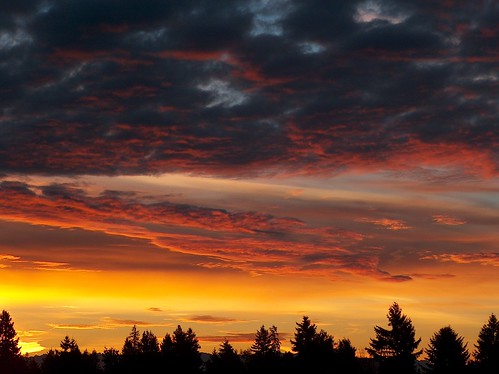

When Sívorí, Goddess of Stars, gave birth to Hérazhahívo, She took one look at His lion-headed, yellow-skinned alligator body and tossed Him out of Her home in disgust. Sívorí’s husband Néhété, God of Smoke, chastised Her, for She had the body of a human being and the head of a black heron, while Néhété Himself had the head of a fly and the body of a rat, so Who was She to complain? Unpersuaded, Sívorí stormed off and danced by Herself in a distant corner of the universe.
Needing a good home for His newborn son, Néhété took Hérazhahívo to a group of demigods and demigoddesses known as the Séhalas, Who lived deep in the forest. Many of the Séhalas had hind legs and horns like goats, so They knew much about nature and the ways of the universe. The Séhalas gladly accepted the responsibility of raising Hérazhahívo and assured Néhété that They would teach Him well.
The Séhalas did indeed care well for Hérazhahívo and teach Him all the knowledge They had to give. When He became old enough, They welcomed Hérazhahívo to Their nightly festivities, which often transformed into orgies deep into the dark hours. Despite all the sexual energy around Him, Hérazhahívo discovered that He could not get aroused. Numerous Séhala demigoddesses were sorely disappointed. Hérazhahívo also was disappointed, and so He sat at the edge of the forest clearing, glumly watching the fun.
Oftentimes, other gods would be invited to join the merriment. In this way, Hérazhahívo met Píríuso, God of the Sun. Late into the night, the golden sun god staggered away from the orgy and collapsed near Hérazhahívo. Despite Píríuso being sexually drained, as well as drunk, the two gods had a lengthy conversation about items sundry, including Píríuso’s duties as the sun god. Eventually, Hérazhahívo realized that the sun should have risen already, and yet the sky was black. He told this to Píríuso, Who immediately jerked awake, frantically searching around and about the orgiastic Séhalas for all His clothing and belongs.
Thinking quickly, Hérazhahívo raced a Séhala chariot ahead of Píríuso to the sun god’s stables far beyond the Eastern Ocean. Once there, Hérazhahívo threw open the gates to the sky, making way for Píríuso’s golden chariot. While Píríuso hastily assembled His team of horses for the daily journey, Hérazhahívo grabbed a fistful of fire from a nearby hearth and, grabbing a passing seagull, rose up from the ocean to shed light on the world’s new day. Shortly after Hérazhahívo’s dawn, Píríuso pulled the sun above the horizon, starting the day with brilliant rays of pure sunlight.
Píríuso thanked His new friend as He rode by. From that day forward, Hérazhahívo would open the gates for the sun god and announce His imminent arrival by carrying the first rosy reaches of light into the morning sky. To aid His lofty flight, Hérazhahívo grew a giant pair of wings with pure white feathers. Each dawn, Hérazhahívo floats above us, granting the day’s first light to all.
In the evenings, Hérazhahívo would return to the Séhalas, for They were His true family, but He remained morose during Their festivities, since He was still inadequately virile. One day, though, Hérazhahívo spied a young mortal woman walking through the woods. He instantly fell in love. He approached Her and asked her name, to which she introduced herself as Tíhutozhí. He told her His name with a most chivalrous greeting, to which Tíhutozhí flashed a beautiful smile. Instantly, Hérazhahívo’s manhood enlarged to magnificent proportions, nearly hitting the young woman in the face. Tíhutozhí shrieked and ran away.
Quite distraught and apologetic, Hérazhahívo called out to Tíhutozhí and started to chase after her. Unfortunately, with His enormous phallus, Hérazhahívo could hardly move. Tíhutozhí disappeared from His sight, hidden by the trees. Several Séhalas heard Hérazhahívo’s cries and came running to aid Him, but when They saw His gigantic manhood, even the sexually experienced demigoddesses fled in fright, too. The Séhala demigods chased after Their female counterparts, hungry with lust.
All alone in the forest, with only His immobilizing phallus for company, Hérazhahívo roared in distress. He had found His one true love, but had scared her away. Worse still, sunrise was approaching and He wouldn’t be able to get to Píríuso’s stables in time to start the dawn. Hérazhahívo strained and strained, flapping His wings, trying to get off the ground, but His feet remained stubbornly stuck to the forest floor. His phallus was too heavy.
Abruptly, Hérazhahívo separated into two bodies: one with a lion’s head, yellow alligator body, and enormous manhood; and one with white wings and a more elegant form, draped in a saffron robe. Being a god, He was quickly able to handle being two places at once. While His phallus-laden body waddled back toward the Séhala camp, His winged form flew on the pre-dawn breeze across the Eastern Ocean. He opened Píríuso’s gate with His new, rosy-tipped fingers and carried the dawn high into the sky, announcing to all the world the approaching sun god.
After the sun rose, Hérazhahívo flew across the land in search of Tíhutozhí. He was aching to find His one true love, but she was nowhere to be seen. Becoming increasingly crazed by His new sexual energy, Hérazhahívo resorted to snatching up other young women in the forest and fields and bringing them to His land-bound body. The same thing happened every time, however: as soon as a woman got within sight of His gargantuan phallus, she’d scream uncontrollably and run as fast as she could away from Him. Only through physical force with both His bodies could Hérazhahívo keep a woman near Him long enough to satisfy His vast desire. Sadly, once He let go, no amount of persuasion would get a woman to stay.
With a lion’s roar of agony, Hérazhahívo began to cry. He cried until His lion eyes ran out of tears, and then He cried from His winged body’s eyes. As He climbed into the sky the next morning, Hérazhahívo’s tears spread across the land, covering the world in its morning dew. To this day, He continues to cry, and so the dew falls.
One morning as He flew above the world, Hérazhahívo spotted Tíhutozhí. He blinked the tears from His eyes, not believing what He saw, but it was her. He flew down and, before He introduced Himself again, she said His name, recognizing Him. She said she regretted running away and that she loved Him dearly. There was one problem, however: Tíhutozhí was mortal and thus would die long before Hérazhahívo. Hérazhahívo did not have the power to make her immortal, and so He asked Sozho, High God of Air and King of the Gods, for help. Sozho granted their wish, for He recognized true love, and gave Tíhutozhí the gift of everlasting life. Hérazhahívo and Tíhutozhí thanked Sozho profusely and never left each other’s side -- Tíhutozhí even became used to the sight of Hérazhahívo’s huge manhood.
Several years later, They noticed a problem: while Tíhutozhí wasn’t dying, She was still aging. Her skin sagged and wrinkled; Her frame stooped; Her hair turned white and thin. Hérazhahívo flew to Sozho and demanded answers. Sozho reminded Him that He had asked for eternal life, not eternal youth. Frustrated, Hérazhahívo transformed Tíhutozhí into a cicada so She would never have to be old and frail. In Her insect form, Tíhutozhí sticks to Hérazhahívo’s immobile body, forever together, forever in love.
Nevertheless, the loss of Tíhutozhí’s youth and beauty caused Hérazhahívo to cry even harder than before. His tears brought moisture to the air, keeping all the land He visited fresh and fertile. When the cicada Tíhutozhí fluttered Her legs on His phallus, Hérazhahívo spread His seed upon the land, making the crops fruitful. With Him, the harvest was bountiful. In the land He avoided, there was no harvest to speak of.
Hérazhahívo frequented the kingdom of Rénaka, and their crops were plentiful. His sister Rakazhazhíní, Goddess of Clean Air, did not appreciate the attention that Hérazhahívo was generating there, however. In retaliation, She soaked up His tears and seed with Her swan feathers and, having no comparable phallic fluids, tried to replace them with merely lachrymal offerings of Her own making. Sadly, She was unable to provide adequately, but sopped up Hérazhahívo’s gifts nevertheless. The kingdom of Rénaka suffered drought and famine like never before.
Hérazhahívo roared His disapproval and left Rénaka for the nearby island of Nésíkozho, which became fertile under His care. The king of Rénaka led His people to Nésíkozho, where they prospered. The few who remained behind in Rénaka under Rakazhazhíní’s care starved and perished. All the Nésíkozhoans praised and honored Hérazhahívo for His beneficence.
We should all praise and honor Hérazhahívo. He gives us the moisture and fertility that we need to survive. He brings us the beautiful light of dawn, announcing the coming day. Every harvest we reap, we must honor the Sower with gifts from the bounty. Every morning we rise, we must praise the Dawn-Bringer for another glorious day of life. But beware where you stray, for a wandering woman may attract His boundless desire and never again see her home and family!
Wednesday, June 24, 2009
Photos from Fathers Day
Fathers Day hike photos on flickr. . .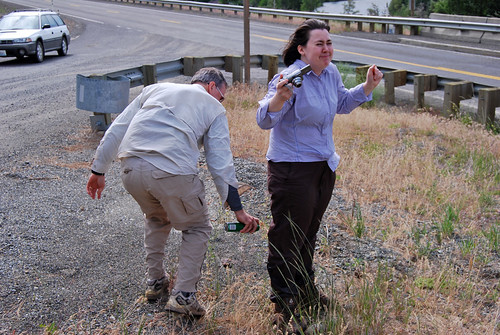
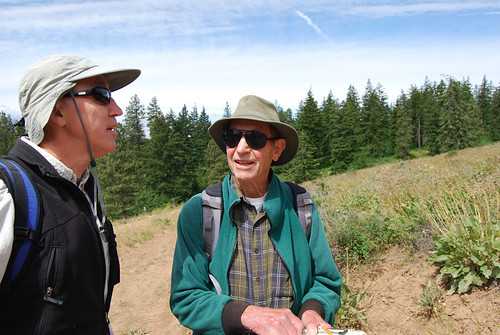
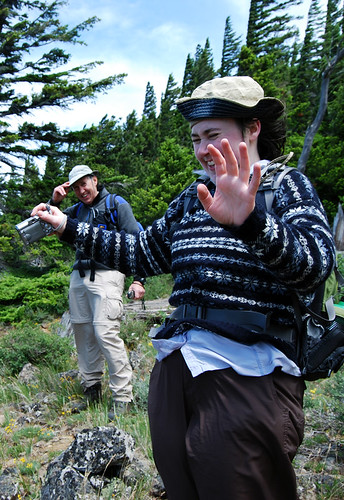

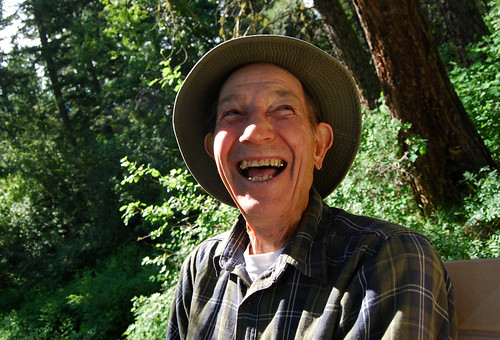
Posted by Sotosoroto at 22:22 0 comments
Tuesday, June 23, 2009
The Tale of Zhíanoso

Today's the Holy day of Zhíanoso, the Bright One, the Creator of the Universe!
Fittingly, I now present to you the full history of the universe, from beginning to beginning.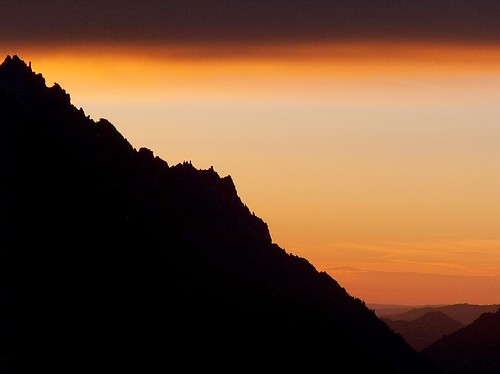

In the beginning, there was nothing. Soon thereafter, there was Zhíanoso. He saw nothing and felt that this was wrong. Thus decided, He created the universe. Stars and planets and comets formed from His thoughts. He created them to the best of His knowledge and then watched them spin through time. He saw what He had created and was pleased, for it was good.
This was entertaining for a while, but soon Zhíanoso grew bored and wanted to obtain a physical form and stroll around. He called Sívorí, Goddess of Stars, back through time to Him and granted Her control of the stars and everything in the night sky, for the multitudes of stars need the guiding hand of a god who understands the complexities of every situation and Sívorí was just such a goddess. Zhíanoso called Píríuso, God of the Sun, back through time to Him and granted to Him special control of the sun, for an item of such importance needs a firm hand and strong mind at all times, and Píríuso was just the god for such a task.
With the heavens in good hands, Zhíanoso descended from that realm down to our world, but was unable to find any dry land. He searched from one corner to another, but there was nothing but oceans across the entire surface. Zhíanoso suddenly realized that He had made the universe too perfect, such that the particles of the world had separated into layers of their individual elements: solid, liquid, gaseous, and igneous. If He was to walk on solid ground without breathing water, Zhíanoso would need to have islands, continents, and the like. So, with a surge of His thought, the crust of the earth began to move, to break apart, to crash together, to form anew, and soon there was land protruding from the seas.
Later that day, Zhíanoso realized something was still wrong. Looking closely, He saw that there was no life in the world. The land needed vegetation and the world needed animals to move across the land, in the seas, and through the air. And it was so. He called Vuzhí, Goddess of Life, and Pétíso, God of Death, back through time to Him and granted Them joint-control over the plants and animals, over life and death. It was a daunting task, but the two gods were well-suited for it: Vuzhí is the ever-loving nurturer of everything She sees and Pétíso is the unforgiving bringer of what is undesired but necessary.
Zhíanoso still was not content, however. In fact, He was afraid that He was going a bit crazy, having only Himself to talk with, since the other gods were busy with Their duties. So Zhíanoso decided to create a human being out of thin air and a clump of mud. He was very careful in constructing him, and even remembered to include the navel and the useless appendix.
He named this new human “Sétané” because it sounded right. While Sétané was busy comprehending his surroundings and naming the animals, Zhíanoso remembered simple biology and knew He needed to create a woman as well. So He put Sétané to sleep and excised a rib from his lower chest. Zhíanoso knew He could have made the woman from mud like He made the man, but He had to be sure that they were of the same kind. When Sétané awoke, he could feel the missing rib and see the woman, and so he realized what Zhíanoso had done. Sétané named the woman Vétaurosí, and they lived in the paradise Zhíanoso had created for them. Zhíanoso saw all that He had made, and it was very good, so He rested for a day.
Sétané and Vétaurosí lived happily in their paradise for an immeasurable number of years, until one day when Zhíanoso formed a test for His creations. He gave the two human beings a gift of a lidded clay jar, with the instructions to never open it. He gave no reasoning, but told them that horrible things would happen if they opened the jar. Sétané and Vétaurosí had no need to open the jar, but what’s forbidden is always what we most dearly want.
Although they were sorely and surely tempted, the first man and woman did not open the jar, and so Zhíanoso was forced to try another tactic to test them further. He transformed Himself into a friendly little rat and approached Vétaurosí. She took Him in her hands and He whispered a suggestion in her ear. Lo and behold, a little furry rodent encouragement was all it took. Vétaurosí incorrectly postulated that if an animal said it was okay, it must be okay, and so she popped off the jar’s lid.
Instantly a swirl of evil erupted into the world, engulfing the paradise. Hate, jealousy, pride, shame, greed, laziness, and gluttony poured from the tiny jar, infecting the two human beings and permeating throughout the universe. Sétané and Vétaurosí got the urge to cover their bodies with leaves, for they were ashamed of themselves. They began to argue and find fault with each other.
Zhíanoso changed back to His usual form with fire-red hair and beard, clad in His favorite toga licking with flames, and proceeded to stroll through the garden of paradise. He found Sétané and Vétaurosí hiding behind a leafy bush and promptly expelled them from the paradise. They had failed the test: a command was a command to be followed forever, no matter what anyone else, not even a cute little rat, may say. Zhíanoso told Vuzhí and Pétíso They could do with the human beings as They wished, to live or die.
Sétané and Vétaurosí were all alone in a world that was no longer the paradise to which they had grown accustomed. They were cold at night, food was no longer plentiful and readily available, and the rain made them wet and sick and miserable. They struggled on as best they could, but to be perfectly honest, they weren’t doing so well. Through it all, however, they continued to honor Zhíanoso and pray to Him for help. And so Zhíanoso sent Voro, God of Hearth Fire, to aid them. Voro showed the two humans how to find food, how to harness fire to properly cook what they ate, and how to build shelter and proper clothing and everything necessary to keep them warm and comfortable.
And so, comfortable and content, Sétané and Vétaurosí soon began begetting. They begat like there was no tomorrow. The world began to fill with humanity. Some were good men, but most turned out to be evil men. Brothers killed brothers and the species went downhill. Many years passed.
Sétané begat Zhéhé, Zhéhé begat Rínozho, Rínozho begat Kéního, Kéního begat Narakarího, Narakarího begat Zhérasíto, Zhérasíto begat Rínaké, Rínaké begat Nohosoro, Nohosoro begat Ranéké, and Ranéké begat Tokéríané.
Tokéríané was a good man, although he was surrounded by evil. This is why Zhíanoso chose to save him. Zhíanoso knew He had made a mistake. He knew that humans weren’t supposed to be perfect, but this bunch was far from it. So Zhíanoso decided He had to do something. Instead of oblivionizing the entire human race with a twitch of His nose, Zhíanoso decided to give the survivors something to fear. He would unleash Rívorí, Goddess of Wildfire, upon the earth, and for once in Her life, He would let Her proceed completely unrestrained. She laughed maniacally at the opportunity to scorch the entire globe. Fire would permeate every grain of rock, every drop of water, every bit of air, until everything in the world was turned to ash. It was Her dream come true!
Zhíanoso told Tokéríané of His plan and instructed him to build a giant box to live inside while everyone else perished. Tokéríané expressed concern that a wooden box would undoubtedly be engulfed by the flames, but Zhíanoso assured him that because his family was pure of heart and devoted to Zhíanoso, they would not burn. Zhíanoso instructed Tokéríané exactly how big to make the box and exactly how to put it together, because after all, Tokéríané was just a farmer by trade and didn’t know anything about carpentry. Tokéríané was reluctant to begin such a large project, but once Zhíanoso convinced Tokéríané that his crops didn’t matter anymore, Tokéríané put all of his time and energy into building the box and soon he had it completed.
Zhíanoso let Tokéríané bring his family inside, just so He wouldn’t have to recreate the humans. He found himself, though, defining “family” as just Tokéríané’s wife, their sons, and his sons’ wives and children. You can never be sure who might call himself a distant cousin when the flames are racing over the ridgeline, He thought. He further instructed Tokéríané to collect seven of every animal and keep them alive with him in the box--except the dirty ones, of which He instructed Tokéríané to collect only two, male and female. Zhíanoso knew all this was an impossible task, especially in the allotted four days, but He thought it would keep the humans happy to know they had done their part for the innocent wildlife.
Once the box was crammed with animals and Tokéríané’s family, the fire began. Rívorí swept across the world, emblazing cities and kingdoms and continents. Whole cultures disappeared in an instant. Even Tokéríané’s grandfather Nohosoro, who was well over thirty-eight cycles old -- the longest-lived human on record -- was reduced to the finest ash by the raging wall of wildfire, for he did not honor Zhíanoso. Only Tokéríané, his wife, and their sons’ families were protected. The box remained intact and unaffected by the firestorms, which lasted ten fourdays.
When the flames dissipated and the ground grew cool enough to walk upon, Tokéríané led his family outside, whereupon they prayed to Zhíanoso for His benevolence in sparing them. Upon the new land, Tokéríané and his son Pívo founded the kingdom of Rénaka. The Rénakans were a good people and Zhíanoso cared for them well. Rénaka was peaceable, prosperous, and powerful. The Rénakans honored Zhíanoso and He nurtured them.
Zhíanoso called Pívo to a solitary mountain, whereupon He gave instructions to the young king on how the Rénakans should live to avoid the troubles of the time before the fires: first and foremost, honor no god but Zhíanoso and bow to no idols of any animal nor god; secondly, do not misuse Zhíanoso’s name, for He is great and shall punish you; thirdly, observe Zhíanoso’s day each fourday by honoring Him and doing no work nor letting others in your care and command do work; fourthly, honor your father and your mother so you will live a long life in Zhíanoso’s land; fifthly, do not kill, for killing is wrong; sixthly, do not commit adultery, steal, nor testify falsely against your neighbor, for Zhíanoso knows all and will judge you harshly; and lastly, do not covet your neighbor’s house, wife, servant, or anything else belonging to your neighbor, for envy will gain you nothing. Pívo took these commandments back to the Rénakans, who took them to heart. Rénaka prospered.
Pívo begat Vétaníko, Vétaníko begat Panaré, Panaré begat Réharé, Réharé begat Síholonaré, Síholonaré begat Pérasanaraté, Pérasanaraté begat Pératané, Pératané begat Vésé, Vésé begat Téhané, Téhané begat Kévé, Kévé begat Katanokovo, Katanokovo begat Víto, Víto begat Vohíhonokovo, Vohíhonokovo begat Valékévé, Valékévé begat Vohíhonakaté, and Vohíhonakaté begat Nuvíní. Nuvíní was a mere mortal before She convinced Zhíanoso to grant Her divine powers to better help His chosen people with crops and construction and such. To help the Rénakans, His chosen people, Zhíanoso made Nuvíní a goddess, and thus She is now the High Goddess of Earth.
During this time, Zhíanoso fathered a huge wolf named Vétaíso. Even when Vétaíso was a puppy, when he opened his mouth, his nose would scrape the stars and his chin would burrow into the ground. In an attempt to be friendly to the new goddess, Zhíanoso gifted Vétaíso to Queen Nuvíní. Nuvíní quite enjoyed having the large puppy around Her castle at first. Soon, though, as Vétaíso grew, Nuvíní found She was unable to control him. The giant wolf broke more than a few tables and doorways in Her castle and ate more than a few servants. Zhíanoso offered to sell Her some replacements.
When Nuvíní had a dream that Vétaíso would cause catastrophic harm to the gods in the coming future, She had the wolf bound with the strongest iron chains She could find. Vétaíso tested the chains, found them to be weaker than he, and promptly broke them. Nuvíní thus made a second chain, mystically stronger than the first, and told Vétaíso that he would gain great fame for his strength if he could break free from this chain. Vétaíso let Her bind him, whereupon he strained and snapped the iron chain as if it were not enchanted. Zhíanoso observed this all with great amusement.
Quite flustered, Nuvíní carefully concocted a new binding that would be stronger than any chain. In the form of a soft, silken ribbon, She pulled together the sound of a cat’s footfall, the beard of a woman, the roots of a mountain, the sinews of a bear, the breath of a fish, and the spittle of a bird. Because these items are encapsulated in the binding, they no longer appear in nature. Vétaíso scoffed at this flimsy ribbon and allowed himself to be tied up. Surprising everyone but Nuvíní, Vétaíso could not break free. He strained and strained, but to this very day, the great wolf remains fettered by the innocuous-appearing ribbon. Zhíanoso was quite upset that His progeny was chained, but He abided Nuvíní’s decision based on Her prophetic dream.
The goddess queen Nuvíní begat Rézhíní, Goddess of Plants. Rézhíní begat the mortal Valénaté. Rézhíní transferred the kingdom to Her son rather quickly, for, like Her mother, Rézhíní enjoyed other things far more than caring for the Rénakans. Also like Her mother, Rézhíní had prophetic dreams, one of which concerned Her untimely demise and the end of the universe. Rézhíní ran to Her father Sozho, High God of Air, and discovered that He, too, had dreamt of Rézhíní’s death and the end of His own reign as King of the Gods.
Sozho promptly forced everything in the world to swear an oath to never harm His daughter, Rézhíní. Since this was a complete affront to the natural order of the universe, where everyone must live and die as Vuzhí and Pétíso see fit, Zhíanoso hid one small plant, the mistletoe, from Sozho’s view. Thus mistletoe was the only thing in the world that did not vow to never hurt Rézhíní. Sozho and Rézhíní relaxed, thinking Her -- and His reign -- safe.
While the other gods amused Themselves by hurling stones and shooting arrows at Rézhíní, which would bounce off leaving Her unharmed, Zhíanoso crafted a bow and arrow from mistletoe wood. He gave this set to Rézhíní’s blind twin brother Nazhoro, God of Coldness, and asked Him to join the fun. Nazhoro did. Much to everyone’s surprise -- except Zhíanoso’s -- the arrow shot straight through Rézhíní’s heart, killing Her instantly.
Zhíanoso proudly proclaimed that this is what They deserved for messing with the natural order of the universe, but Sozho did not see the justice involved. He grabbed Zhíanoso and tied Him to a boulder with a leftover segment of Nuvíní’s enchanted ribbon. While some gods, such as Vuzhí and Pétíso, agreed with Zhíanoso’s point of view, They declined to obstruct the enraged King of the Gods and let the Creator of the Universe be bound to a rock. To add pain to misery, Sozho tied a viper over Zhíanoso’s head and triggered it to drip venom upon the great god.
The venom burned Zhíanoso’s skin, raising horrible blisters. Despite the agony, Zhíanoso uttered not a sound. None of the gods dared help Zhíanoso, for fear of the wrath of Sozho and Nuvíní. To this very day, the great god remains tied to that boulder, blazing with torment yet remaining silent through the pain. Whilst His body is bound, however, Zhíanoso’s spirit flies free. Despite the pain of His corporal form, Zhíanoso traverses the universe and continues helping those who honor Him and obey His commandments.
Rézhíní’s son Valénaté begat Vohíhukaré, Vohíhukaré begat Valénasíto, Valénasíto begat Soníko, Soníko begat Kéníso, Kéníso begat Sérasé, Sérasé begat Sérésé, and Sérésé begat Korotíko. All ruled Rénaka as best they could. Some were wise, some were not. All the kings honored Zhíanoso and obeyed His commandments, although not all of their subjects honored Him. Many Rénakans worshipped Nuvíní, Who had long ago forsaken them, or Rézhíní, Who had long ago died.
King Korotíko ruled in troubled times. Since most of his subjects had abandoned Zhíanoso for the goddesses, Who no longer helped Rénaka, the seasons were harsh and food was scarce. King Korotíko prayed to Zhíanoso for assistance. Zhíanoso listened to the king’s troubles and presented him with a solution: run away. Faced with overwhelming opposition from subjects who did not favor their king’s god and blindly worshipped disinterested goddesses, the only option was to take the loyal Rénakans away from the wasteland that surrounded them. The god informed the king of a large, sparsely populated island across the sea. This is where the Zhíanoso-worshipping Rénakans should travel. Korotíko was hesitant to leave his home country, but Zhíanoso promised the king that he would be the founder of a great nation.
After only four days of sailing, they made landfall. Korotíko declared it to be the island of Nésíkoso, where he founded his new kingdom, which was indeed great. Korotíko built an altar to Zhíanoso and sacrificed four goats. Zhíanoso gladly accepted the sacrifice and reiterated His promise of the whole island of Nésíkoso for Korotíko’s kingdom, from shore to shore.
Korotíko begat Karésuto, who grew tall and strong, just as the kingdom grew large and powerful. To test King Korotíko’s commitment to Him, Zhíanoso appeared to the king and commanded him to take his son Karésuto to the highest mountain on Nésíkoso and sacrifice him upon the altar there. Korotíko agreed readily, for he trusted Zhíanoso implicitly. He led his son to the mountain top, leaving their servants behind. Karésuto asked where the sacrifice was; all King Korotíko could reply was that Zhíanoso would provide one.
High upon the mountain top, with the wind whipping their beards and robes, Korotíko was forced to explain the situation to his son. Karésuto was shocked, but laid himself upon the altar; he, too, trusted Zhíanoso completely. As Korotíko brought the sacrificial knife down upon Karésuto’s throat, Zhíanoso caught the king’s forearm and replaced his son with a ram. Korotíko and Karésuto thanked Zhíanoso profusely for His beneficence; Zhíanoso rewarded the men with great prosperity and longevity for their unwavering devotion.
Karésuto begat Kínohíko, Kínohíko begat Sénaíno, and so the generations flowed past. Kings and cycles rolled through time. Gradually, despite the efforts of the kings, the Nésíkosoans stopped worshipping Zhíanoso. They had so much wealth and power, but they forgot Who gave it to them. The less they honored Zhíanoso, however, the less He nurtured Them. The royal lineage -- the true followers of Zhíanoso -- were lost in the swarm of chaos that Nésíkoso became. They lost the crown but persevered. Throughout the generations, the family worked hard, worshipped Zhíanoso, and maintained what little they had, thanks to the Bright One, the Creator of the Universe.
Zhané, descendent of Korotíko and Sénaíno, knew that if the entire kingdom would but honor Zhíanoso and follow His seven commandments, everyone would have wealth and happiness. But they worshipped foreign gods and there was much misery and brutality. Zhané prayed to Zhíanoso and Zhíanoso listened. The great god ordered Zhané to take the devout group on a great voyage across the ocean. A whole other continent with hardly a soul upon it was waiting to be claimed for Zhíanoso’s people.
Stuffed into as many boats as they could obtain, Zhané and his followers sailed across the ocean. The voyage was dangerous, with high storms and fierce winds, but after several months they spotted land. With much celebration, Zhané led the ragged fleet into a large bay and up a slow river, to make landfall on the first day of winter. Zhané pointed out a clearing in the woods of oak, and that was the founding of the city of Rízhoso‘ono, the city which, thanks to King Furoíso, would become the capital of Naraka, the greatest kingdom in all the world. The first Narakans worshipped Zhíanoso, honored Him as He was due by following His commandments, and Zhíanoso nurtured them and helped their new nation prosper. Without Zhíanoso, Naraka would be nothing. Without Zhíanoso, our great nation would have long ago crumbled. So pray to the Bright One. Do not forsake the Creator of the Universe. He shall provide for us.
In the future, however, the world as we know it shall end. It may be tomorrow; it may be next year; it may be a thousand years hence. When the time comes, the entire world will be wracked by four bad winters of war and famine. Hounds will bay at Nuvíní’s castle with deep, painful howls that will weaken the enchanted ribbon holding the great wolf Vétaíso. Vétaíso will snap the ribbon and race to His father Zhíanoso, freeing Him from His bindings just as he will have broken his own.
Zhíanoso and His magnificent wolf progeny will then punish the gods Who had held Them captive all this time, starting with Nuvíní. Vétaíso will strike his paw through the soil and rock and penetrate deep down into the lair of the earth goddess, landing squarely on Her head. Nuvíní, already preparing for battle, will not be pleased. She will quickly grab the wolf’s paw and try to pull him downwards into Her castle, but Vétaíso will be too large to fit through the hole. Instead, Nuvíní will pull Herself up and, once upon the surface of the earth, She will immediately attack the wolf.
Vétaíso and the goddess will wrestle, locked in each other’s arms and legs, rolling back and forth across the land. The two will be evenly matched until the wolf will realize that he not only can use its legs and claws on Nuvíní, but also his powerful jaws. When Nuvíní feels Vétaíso’s fangs sinking into Her flesh, She will realize that She needs a similar weapon, so She will transform Herself into a giant cougar. She will then promptly sink Her ill-gotten teeth into Vétaíso’s shoulder.
And so the two will continue to fight claw to claw, fang to fang, and occasionally disengaging to take a better swipe at the other. At one time, the wolf will appear to have the cougar on the defensive, but soon thereafter, the cougar will appear to have the wolf at the disadvantage. For hour after hour, Nuvíní and Vétaíso shall battle.
But then a mosquito, which will just so happen to be Zhíanoso in disguise, will bite the cougar. Nuvíní will be distracted enough so that Vétaíso will wrap his giant jaws around Her head. He will bite down hard, snapping Her neck, and then proceed to eat Her entirely, tearing Her into itty bitty pieces and digesting them all.
Needless to say, this will cause a bit of consternation among the other gods. The life-loving Vuzhí will be the first to respond, and in Her desire to save other beings from the fangs of Vétaíso, She will strike the wolf dead. But at the shock of having killed a living creature for the first time in Her life, Vuzhí will go insane. Madly, Vuzhí will attack everything that She will have held dear, starting first with Her friends Hívuítoví, Goddess of Rain, and Voro, God of Hearth Fire.
Unlike the wolf, however, They will be able to mount a defense against Vuzhí. Unfortunately for Them, Hívuítoví will counter Vuzhí’s attack with a sudden burst of rain while Voro will counter Her attack with a giant gout of flame. The fire will scorch the earth and the water will flood the land, but before they reach Vuzhí, the two will cancel each other out. Their net effect against Vuzhí’s attack will be null. Thus two gods shall die at the hands of Vuzhí, Goddess of Life. Thankfully, Pétíso will then be able to get ahold of His wife, Vuzhí, and end Her murderous rage with a swipe of Her own dagger across Her neck, but the deeds will be done. Four gods will be dead.
Nothing good can follow when Death kills Life. Announcing the coming end, Névazhíno, God of Animals, will blow His mighty horn and the War of the Gods shall truly begin.
Hearing the horn, Kérasa, High God of Water, will see Her opportunity to destroy the universe and the gods that had haunted Her for so long. She will regenerate Her giant scorpion claws and Her fangs on all hundred of Her viper heads. Then She will call Her demons, dragons, and evil gods to Her side and engage in battle against the gods of goodness. At the fore of the forces of light, Zhíanoso shall raise His sword on high and lead His followers into the fray. At His side will be His two children, Rívorí, Goddess of Wildfire, and Zhoro, God of Heat. Both will slay great multitudes of evil demons and dragons, laying waste to legions of doom, leaving nothing behind but blackened ashes.
Zhaké, God of Rivers, will demand retribution from Zhíanoso for supposedly having started the disaster. Huro, God of Thunder, will call for the destruction of all the water gods since Kérasa had gone evil and attacked everyone. Zhaké and Huro will get into a terrific ruckus over Who is to blame. Rivers will overflow their banks, lightning bolts will fill the sky, snakes and chickens will fight to the death, and thus the universe will take another step toward its demise.
For the mortals, there will be nothing to fear, if only you honor Zhíanoso and obey His commandments. As He had let Rívorí run rampant over the earth, so many years ago, Zhíanoso will unleash Rívorí and Zhoro upon the land. Only the truly devout will be spared. Only those who are pure of heart and have the utmost dedication to Zhíanoso will escape the scorching fire that will engulf the world. All those who worship other gods will be destroyed. Those who have honored Zhíanoso and obeyed Him will be at His side when the War of the Gods is at an end. Even the devout in the underworld, who happen to have not yet been reincarnated, will be taken to Zhíanoso’s side.
Huro will slay Zhaké, but when the river god’s bloodwaters flow from His body, Huro will disappear under their waves. Hérazha, Goddess of Wind, will rush up, trying to blow away Zhaké’s blood, but Her rescue attempts will prove futile and Huro will drown. Hérazha’s winds, though, will sweep across the battlefield, knocking all the gods and demons off their feet and blowing over a mountain, which will land upon Hérazha’s allies Néhété, God of Smoke, Hérazhahívo, God of Humidity, Rakazhazhíní, Goddess of Clean Air, and Sorosotuzho, God of the Atmosphere, and kill Them all. Vasataté, God of Oceans, will try to stop the wind before it causes any lasting damage, but His efforts will only result in the drowning of Hérazha and the flooding of huge swaths of the earth.
Zhoro and Rívorí will vaporize Vasataté’s waters, then utterly destroy Vasataté. Hívo, God of Clean Water, will attack Zhíanoso’s offspring, but He will be no match for Them and will be burned to death as well. Kara, Goddess of Soil, will demand revenge for Her father and lover’s death. She will burst from the earth, Her eight tentacles striking at the fire gods, wrapping Them tight. Kara’s sister Sívorí, Goddess of Stars, will come to the aid of Zhoro and Rívorí, struggling to free Them from Kara’s grip, but Kara will bite Sívorí’s bird head clean off, rendering the wise goddess deceased. Pétíso, clad in His Helm of Darkness which makes Him invisible, shall sneak upon the monster octopus of the earth and stab Kara through the heart, thus freeing Zhoro and Rívorí.
Korutuzho, God of Agriculture, will go into a rage at the death of His mother Kara and, slashing His sickle through the air, will attack Pétíso. Névazhíno, God of Animals, and Nokí, Goddess of Food, will advance at Korutuzho’s sides, while Zhoro and Rívorí will stand staunchly beside Their ally, Pétíso. Nokí will swing Her giant club at Zhoro’s head, but He will strike Her dead with a burst of flame. Névazhíno will lower His antlers to gore Rívorí, but She will dispatch the animal god as easily as Her brother killed Nokí. Waving His sickle at the invisible Pétíso, Korutuzho will connect and draw blood. Seeing the blood and knowing where He stands, Korutuzho will jump upon Pétíso, wrestling Him to the ground. The two gods shall roll along the earth in a vicious embrace, flattening mountains and cities with no concern. Rana, Goddess of Clouds, shall try to stop Them, but will be crushed by Their mass. Sozho, High God of Air, Who had killed Pétíso twice before and beaten Their father Korutuzho in combat, shall step forward and slice both Their heads off with one stroke of His sword, ending that mighty struggle instantly.
Upon seeing His lover and sister Rana killed, Rékaré, God of Rock, will lose His last shred of sanity. Cackling like a goose, Rékaré will raise His heavy stone club and recklessly charge at His eternal enemy Vítí, Goddess of Ice, Who shall freeze Him and, with a touch of Her sword, shatter His body into a million shards. Ríhíví, Goddess of Hot Springs, will gently chide Vítí for the destruction of Ríhíví’s friend, but Vítí will have no tolerance for petty recriminations. Without giving Ríhíví a chance to fight back, Vítí will freeze and shatter the mother goddess the same way as Rékaré.
Siblings Píríuso, God of the Sun, and Tarénara, Goddess of Hunting, will face each other in a combat for which both have long yearned. Tarénara shall loose an arrow at Her brother, but He will catch it with one hand and snap it in two. Píríuso will snatch a piece of the sun from the sky and, holding the flaming ball high in His hand, will race in His golden chariot down upon His sister. Tarénara will flee, shooting ineffectual arrows over Her shoulder, all the way to the moon. Píríuso will throw the piece of sun at Tarénara, but it will instead hit the moon, scorching it black. In turn, Tarénara will heave the moon at Her brother, but He will dodge and the moon shall instead strike the sun. The two heavenly bodies will explode catastrophically, leaving the world devoid of light in day or night. The two sibling gods will be caught in the explosion, dying with the orbs They will have for so long tended.
In the darkness, the remaining seven gods will face off. The blind Nazhoro, God of Coldness, will for once have the advantage. He will swing His well-crafted axe at Sozho, the father Who had long shunned Him, and lop off His head. Not foreseeing the imminent threat, Sozho will not be wearing His impenetrable cloak, and thus the King of the Gods will die. The Tablet of Destinies, which proclaims its holder to be the Ruler of the Universe, will fall to the earth at Nazhoro’s feet. The tablet also documents the destinies of all souls, both god and mortal, for the entire length of the universe. Sozho will have known of His impending demise, and yet He will not have been able to prevent it.
Zhíanoso will shine His glorious light upon Nazhoro, then set Him ablaze. Kérasa, however, will shed Her endless supply of tears and put out the flames. Zhíanoso and Kérasa will engage in combat, the fire god defending Himself against all Her hundred heads, slicing His sword through Her necks one by one. With Zhíanoso illuminating all, Nazhoro and Vítí will square off against Zhoro and Rívorí.
The wise war goddess Vítí will cautiously circle the wild Rívorí. Rívorí will hurl wildfire at the ice goddess from all directions, utterly obliterating Her. Rívorí will be the only One unsurprised by how quickly She will defeat Vítí.
Adjacent on the battlefield, heat shall meet cold and heat shall win. Nazhoro will die at Zhoro’s hands, not for the first time, but for the last, definitely. Zhoro shall take the Tablet of Destinies and give it to His high god Zhíanoso, for Zhíanoso is the Creator of the Universe and the only god truly deserving of the tablet and the power it bequeaths. The great god shall raise the Tablet of Destinies on high, showing it to Kérasa. And Kérasa will tremble in fear.
Finally, at the end, all that will be left of the great armies of gods and demons will be Zhíanoso, Rívorí, and Zhoro encircling the evil, insane Kérasa, as She lashes out at all three gods with Her multitudinous snake heads, snapping at Them with Her huge claws, slapping at Them with Her giant tail. Kérasa will know no reason; She will know no sense. She will be the monster She always has been.
As the four gods pull the power of the universe to Them for Their final confrontation, the last shreds of the earth will dissipate into emptiness, eaten up by Their needs for energy. Nothing will be left of our world, yet those who have faith in Zhíanoso and honor Him will survive within Him.
The four gods will hurl water and fire at each other, primordial elements clashing in great gouts of conflict. Kérasa’s chaotic energy will swarm over the fire gods’ order and light, nearly overpowering Them. To give Zhíanoso enough time to summon the strength needed for an ultimate attack, Zhoro and Rívorí will use every last ounce of Their energy to break through Kérasa’s chaos and draw Her attention away from Zhíanoso. The great god Zhíanoso will be left nearly defenseless, with nothing but the indestructible yet small Tablet of Destinies to shield Himself with, as He draws every last creative energy in the universe to Him.
The hundred-headed monster Kérasa will focus on the two lesser gods, which will be Her final mistake. She will wrap Her chaos around Zhoro and Rívorí, slowly devouring Their essences, enjoying every minute of it, whilst Zhíanoso prepares to destroy Her. Just as Rívorí and Zhoro complete Their ultimate sacrifice, Zhíanoso will hit the water goddess with the full force of the universe.
Through creation, Kérasa will be destroyed. The powers of goodness and growth will defeat the powers of evil and destruction, shrinking the chaos to an infinitesimal dot. For a brief instant, Zhíanoso and all the good and honest souls He will have saved will be alone in the void. It will actually be less than void, it will be less than nothingness, it will be less than the smallest amount of nothingness that you could possibly imagine. There will be no place; there will be no time.
But then, thanks to Zhíanoso’s magnificent creative power, the nothingness that will have been Kérasa will suddenly expand back into form, bringing the universe into existence once again, just as it was before, in the beginning. Those mortals who honored Zhíanoso and followed His commandments in their lives will walk with the Bright One in the new world. Zhíanoso will see what He will have created and He will be pleased, for it shall be good, and He shall rest for a day.
Long ago, Zhíanoso created the universe and all that is in it. Zhíanoso created the first man, Sétané, and the first woman, Vétaurosí. He nurtured them and, despite disobeying Him once, they honored Him. Their family prospered.
After many generations, though, few honored Zhíanoso. He scorched the earth and burnt all but the good man Tokéríané and his family. Zhíanoso guided Tokéríané to become King of Rénaka. Zhíanoso nurtured the Rénakans and they honored and obeyed Him. Rénaka prospered.
After many generations, most in Rénaka did not honor Zhíanoso. He abandoned them and guided King Korotíko, descendent of Tokéríané, and the loyal Rénakans across the sea to the island of Nésíkoso. Zhíanoso nurtured the Nésíkosoans and they honored and obeyed Him. Nésíkoso prospered.
After many generations, most in Nésíkoso did not honor Zhíanoso. He abandoned them and guided Zhané, descendent of Korotíko, and his loyal followers across the ocean to a new land to found the city of Rízhoso‘ono. Zhíanoso nurtured the Rízhoso‘onoans and they honored and obeyed Him. Rízhoso‘ono prospered. As they expanded across the new continent, the people became known as Narakans.
After many generations, the Narakans were dispersed and disconnected. Zhíanoso guided King Furoíso, descendent of Zhané, to unify Naraka. Zhíanoso nurtures Naraka and we honor Him. Naraka prospers and will prosper as long as we honor and obey the Bright One, Zhíanoso.
Monday, June 22, 2009
Virus to Vaseline
A virus makes my nose generate excess mucus, which gives me a sore throat, for which I drink tea, which makes me go to the bathroom, after which I wash my hands, which dries out my skin, for which I use vaseline.
In healthier times, heat will have the same effect on my hands, via cold water consumption.
Posted by Sotosoroto at 13:17 0 comments
Index: health
Friday, June 19, 2009
10,000 per Year
A year ago, I had one 2007 Solstice Parade photo hit 5,000 views the day before the 2008 parade. Today (a day before the 2009 parade), I have five photos from last year with over 5,000 views, two of which are over 10,000 views.
Of those two over 10,000 views, one has been favorited by 67 flickr users and the other, 42. A year ago, I think my highest was ten favorites for a photo.
I think there may be a connection between the popular photos, but I haven't quite placed a finger on it yet. They are entitled Scarf Suspenders Rollerskaters (the most viewed) and Rollerskaters Laugh More (the most favorited). See if you can figure it out...
Posted by Sotosoroto at 14:57 1 comments
9
I've now been working at the same company for nine years.
Nine.
That month of unemployment after college was just too much for me, I guess!
Posted by Sotosoroto at 08:02 1 comments
Wednesday, June 17, 2009
Snow Lake . . . or Just to the Pass
Chunlin and I took a little hike Sunday afternoon.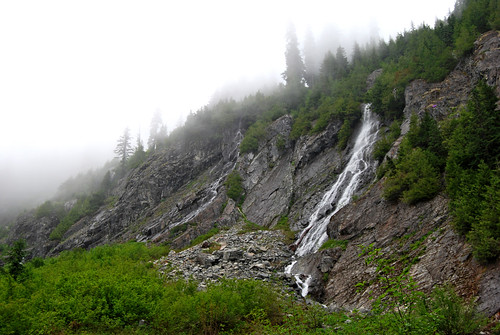
The creeks were running high and the snowfields were large, but the trillium and avalanche lilies were blooming and we just about had the trail all to ourselves.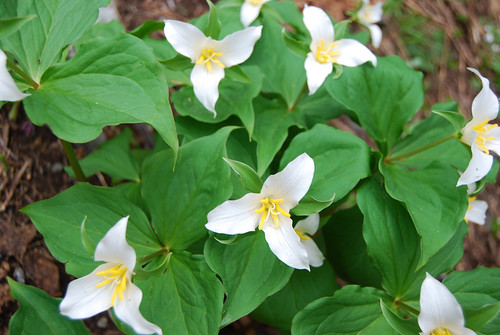
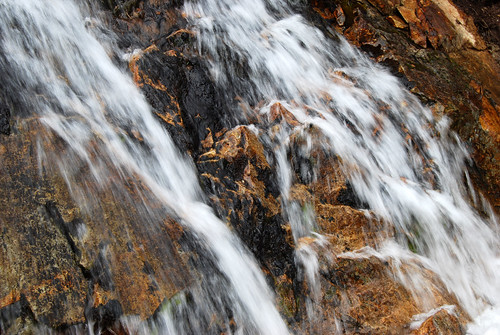
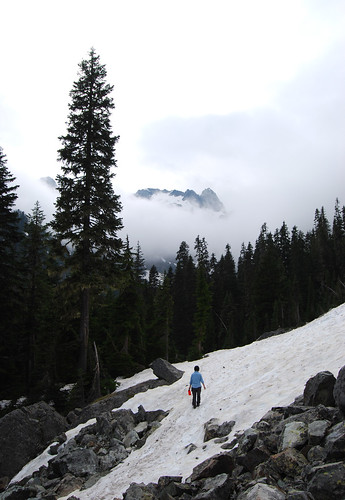
At the pass, we got a face full of fast-moving cloud.
There wasn't a chance of seeing the lake below us and the mountains ahead. We also didn't bother to even take a look at the trail down. We'd both been to Snow Lake in better weather and I recall that the north side of that ridge is treacherous from snow, long after the south side melts out. And since the south side still had several feet of snow in places. . .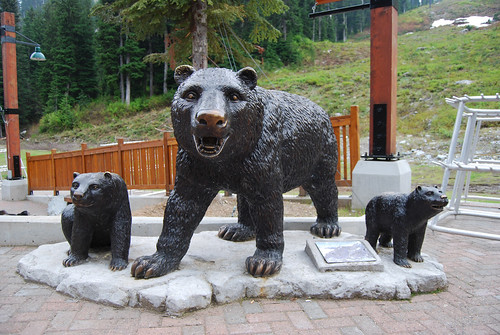
At the Alpental lodge, the place seemed deserted but the building was nearly shaking from music. I couldn't tell if it was live or recorded, but it was the Rolling Stones' "Sympathy for a Devil" performed by a bass, a banjo, and vocal.
I posted a couple dozen photos from our hike on flickr, if you'd like to see.
Posted by Sotosoroto at 16:38 0 comments
Tuesday, June 16, 2009
Bad Taste in My Mouth
Why doesn't coffee taste very good in the afternoon? It's a new pot, even.
Maybe it just takes awhile for my taste buds to wake up.
Posted by Sotosoroto at 14:17 0 comments
Free New York Times
Yesterday and this morning, we had a slim copy of the New York Times on our driveway, "complimentary."
I threw them away.
Eww.
Posted by Sotosoroto at 07:54 1 comments
Sunday, June 14, 2009
Happy Flag Day!
Posted by Sotosoroto at 13:56 0 comments
Index: flags, holidays, photos, unitedstates
Saturday, June 13, 2009
An Evening Out

While the pork shoulder Boston butt roast cooked last night, we went to Gasworks Park.
It's very tiring watching the sun set and reading books.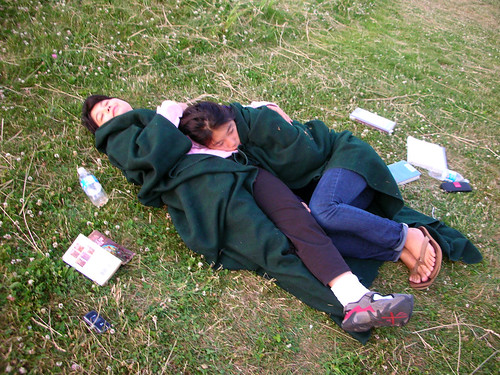
(More photos on flickr, at the bottom.)
Posted by Sotosoroto at 11:20 1 comments
Tuesday, June 09, 2009
Monday, June 08, 2009
The Tale of Névazhíno

Pray to the Great Love of the Universe, for today is the Holy Day of Névazhíno, God of Animals!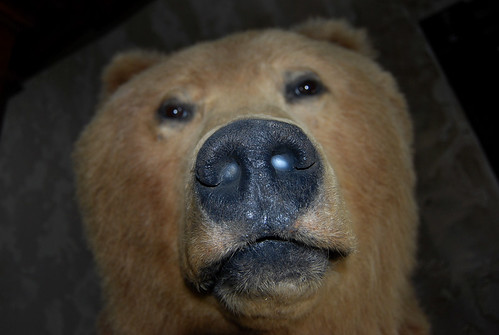

The great god Névazhíno stands twenty-five feet tall, not counting His magnificent antlers. His head resembles that of a stag while the rest of His glorious self appears similar to a man, with muscles aplenty. Around His thick neck slithers a ram-horned serpent, ready to perform Névazhíno’s divine bidding. Despite His imposing stature, Névazhíno uses His strength only to achieve and maintain peace, and never for violence and war. He is the Great Love of the Universe and the holder of all the wisdom of the forest. He would never hurt so much as a gnat.
When the world was young, only gods inhabited the universe; no animals yet existed. Névazhíno saw this as a grave travesty and sought to rectify the situation. Using His impressive creativity and creation skills, Névazhíno began forming each and every animal, one by one, great and small. Beyond their form, He also imbued them each with their traits that make them truly the animals we know them as.
Starting with one of the lesser animals, Névazhíno created the slow and slimy slug, to which He granted lethargy. Next He formed the tiny gnat, to which He gave love and a desire to be around others. Thus warmed up, Névazhíno proceeded to the greatest animal of all, the deer. Basing its head upon His own form, Névazhíno sculpted a most beautiful creature filled with love, peace, and the harmony of nature. To the male of the species, He gave magnificent antlers similar to His own, with strength and stature to match.
After a moment’s rest, He then proceeded to form the crane and the heron based on the appearance of Sívorí, Goddess of Stars, both animals imbued with serenity. Next He created the gelatinous jellyfish, inspired by the hair of His sister Hívuítoví, Goddess of Rain, and infused great melancholy within its soft form. Névazhíno then formed the powerful shark and gave it arrogance and viciousness. Next He made an animal based upon His friend upon His shoulders, the simple yet powerful snake. He gave the new snake patience and poise, and the ram-horned serpent was pleased.
Next created was the rat, full of mischief, based upon the body of Néhété, God of Smoke and Poisonous Air; followed by the cats, both wild and domestic, full of pride and confidence, designed after one of the manifestations of Névazhíno’s mother Ríhíví, Goddess of Hot Springs. He then made the beetle, full of quiet insanity; the octopus of the deep, filled with independence, similar in form to Kara, Goddess of Soil; the buffalo and cattle, filled with composure and might, with heads like Sorosotuzho, God of the Atmosphere; the sea lion, master of the ocean and filled with joy and cleverness, modeled in form after Hívo, God of Clean Water, but without wings; the mighty bear, filled with both indifference and anger; the alligator, full of hidden rage and with a body like Hérazhahívo, God of Humidity, but with black skin; the whistling marmot, full of teamwork and delight; and the armadillo of the desert, incased with fear, based on another of Névazhíno’s mother Ríhíví’s manifestations.
Névazhíno then finished His animal creation with the roly-poly woodlouse, filled with panic; the annoying mosquito, filled with wickedness; the soaring eagle, filled with stolidity and honor; the orca, king of the deep, filled with power and calm; the toad, full of sorrow; the oyster and the clam, full of apathy; the dog and the wolf, both full of greed and loyalty, disparate though that might seem; and lastly the chicken, imbued with folly and futility.
When Névazhíno finished His creations, He sat back and watched, for He was rightly proud of what He had produced. His sister Hívuítoví, however, grew jealous of Her brother’s wondrous fruitfulness. She begged Her husband Zhíanoso, High God of Fire, to create a being that would put Névazhíno to shame. Zhíanoso refused, saying He was a god of fire and not creatures. Hívuítoví flew off in a huff, still quite jealous.
Meanwhile, at the far end of the world, Rana, Goddess of Clouds, was chasing after the Necklace of Desire, which was rumored to make the wearer infinitely desirous to all observers. The necklace was in the possession of four demons deep in a mountain. Rana did not hesitate to dive into the cave and demand they give Her the necklace. The four hideous demons smiled at the opportunity which had presented itself. They agreed to Rana’s demand on one condition: She must let each of them bed Her.
Overcome by lust for the Necklace of Desire, Rana eagerly consented, letting each of the four dark demons have his way with Her heavenly body. After all five had cooled off, the demons presented Rana with the necklace. She placed it around Her neck and returned to the land of the gods, quite smitten with Herself.
The necklace worked. All the gods lusted after Rana even more than usual and She enjoyed toying Them along. That night, as Rana and Rékaré, God of Rock and not Her husband, slept off an evening of debauchery, Zhíanoso slipped into Her bedroom and slipped away with the necklace. He intended to give it to Hívuítoví to improve Her mood, but first He had to hide from Rana and a rampaging Rékaré.
Turning Himself into a sea lion, Zhíanoso swam along the shore, grasping the necklace in His mouth. Soon He came across a rookery teaming with sea lions He could hide amongst. Zhíanoso flopped Himself onto a rock next to another sea lion and made Himself comfortable. He dropped the Necklace of Desire onto the rock and admired it glittering in the sunlight. The neighboring sea lion eyed the necklace, but settled down for a nap. Zhíanoso relaxed, knowing that Rana and Rékaré would never find Him there, and sank into a light sleep of His own. All He had to do was wait. Being immortal, Zhíanoso had all the time in the world.
Suddenly the neighboring sea lion reared up and transformed into a twenty-five-foot-tall god with a stag’s head and antlers that scraped the sky. It had been Névazhíno the whole time! His ram-horned serpent scooped up the necklace and slithered up to Névazhíno’s high shoulders, whereupon the be-antlered god kicked Zhíanoso into the ocean. The startled fire god swam away, ashamed to have been bested at His own game of trickery.
For His part, Névazhíno bounded across the land and presented the enchanted necklace to Nuvíní, High Goddess of Earth, for She was His high goddess and the Queen of the Gods. Although She didn’t need it, the necklace would be safe with Nuvíní for all time. The rest of the gods begrudgingly congratulated Névazhíno for His skill and wit.
Zhíanoso, however, was preparing for revenge. He had to prove to the gods that He was greater than the Love of the Universe, Névazhíno. To do so, Zhíanoso finally agreed to Hívuítoví’s request: He would make a creature greater than any of Névazhíno’s animals.
Fashioned in His own image, Zhíanoso carefully created the first man. Hívuítoví was at first quite proud, flying around Névazhíno and hurling taunts down upon Him, but then They both realized that the man was rather dull. He had no attributes; he had no emotions. Zhíanoso had omitted an important step.
In an attempt to right Her wrong, Hívuítoví decided to take the fire of the gods and give it to the man. Névazhíno warned Her not to do so, for it would upset Sozho, High God of Air and King of the Gods, Who would see man’s possession of fire as an affront to the natural order of the universe. Hívuítoví ignored Her brother’s sage advice and flew down to the man with a small horn filled with embers. The man quite appreciated the gift, which indeed lifted his spirits as he learned fire’s many uses.
Much as Névazhíno predicted, though, Sozho became quite agitated. He captured Hívuítoví and chained Her to a boulder, whereupon He had one of His eagles peck out Her liver. Since She is immortal, Her liver grew back overnight; thus the eagle returned to eat it every day. If only Hívuítoví had listened to Névazhíno, She could have avoided the agony of this torture; but mankind would be nowhere without Her.
Not to be outdone by Zhíanoso, Sozho created a woman for His own amusement, having explored every opportunity with the goddesses and demigoddesses. He named her Vétaurosí, had His way with her, and soon grew weary of her less-than-divine stamina. Thus Sozho gave Vétaurosí to the man to be his wife. She willingly went to him, but she did not know love till she met Névazhíno. He treated her with great respect and devotion, caring for her as one would expect the Love of the Universe to do.
By Névazhíno, Vétaurosí gave birth to a daughter and named her Víhosí. Víhosí grew up strong and beautiful and married a young man named Tokéríané. These two human beings were among the few good and decent persons in the world. At this time, most of the descendents of Vétaurosí and the first man had fallen to evil ways, thanks to the trickery and treachery of the god Hívo. Murder, brutality, and chaos ruled the land for mankind. Névazhíno wanted dearly for His daughter and her family to live in a prosperous, peaceful land, but this seemed unattainable, despite how great and powerful Névazhíno was.
What He really needed was a great flood to wash away the wicked human beings, but Névazhíno, while magnificent, could not create a flood. He needed Hívuítoví, Who could bring endless rains upon the earth. With the help of a well-respected demigod healer, Névazhíno released His sister from Her bindings. She thanked Him profusely as They ran from Sozho’s sight.
Hívuítoví had seen what had become of humanity and so She was more than willing to help Her brother erase the evil scourge from the earth. Acting quickly, Névazhíno had Tokéríané and Víhosí build a large boat so they could ride out the flood, while Névazhíno rounded up a male and female of each and every animal He had created. Hívuítoví began the rains as the Víhosí and her husband herded the two chickens aboard, last of the animals.
The rains pounded the earth, obliterating what little remnants of civilization had not been destroyed by humanity itself. Men died by the thousands, as did animals, which made Névazhíno extremely sad. He knew it had to be done, though, for the good of the future of the universe, which would be placed in humanity’s care.
For ten fourdays, Hívuítoví’s rains never ceased nor so much as eased in the slightest. Soon not a mountain peak protruded from the waves. Upon seeing the endless ocean and knowing what lay buried beneath, Névazhíno told His sister to stop, and She did. Gradually and ever so slowly, the waters receded, until Víhosí’s boat scraped bottom on a mountain top. Víhosí and Tokéríané emerged from the boat, to be greeted by Névazhíno, Who informed them that it was up to them to rebuild civilization in a new and healthy manner.
While the rest of the floodwaters subsided, Tokéríané herded the animals out of the boat and down the mountainside. Víhosí, for her part, began making a home for them, with Névazhíno’s help. The woman, though, became quite infatuated with Névazhíno, for He is the Love of the Universe, after all. In order to help rebuild the human race, Névazhíno decided to give Víhosí what she wanted. While her husband was away, the god mated with the woman.
When Tokéríané realized what had happened, he was furious. If not for Névazhíno’s intervention, he very well may have struck his wife. Névazhíno calmly explained to the man, though, that the child born would be Harasé, father of all slaves. Tokéríané considered this, saw the good, and when Harasé was old enough, Tokéríané put him to work.
Névazhíno visited his favorite human family again to find Tokéríané and Harasé out in the field while Víhosí worked in the house. Since there were still not enough human beings, Névazhíno mated with Víhosí once more. This time their son was Karasé, father of all peasants and commoners. Tokéríané put him to work, as well.
When once again Névazhíno paid Víhosí a visit, He saw Tokéríané struggling to control all his slaves and peasants. Thus Névazhíno mated with Víhosí to produce Soroso, the father of all nobles. Tokéríané welcomed Soroso’s help and raised him as his own son. In this way humanity grew and flourished.
If you trust in Névazhíno, you too shall flourish and your soul shall grow. He is the Great Love of the Universe, the embodiment of all natural wisdom, the powerful peacemaker Who can outsmart the tricksters. He created every animal, so treat them well, whether beautiful deer or lowly woodlouse. He is the father of humanity, whether master or slave, so treat each other with great care. We are all brothers under Névazhíno.
Saturday, June 06, 2009
Our Grand Tour of Eastern Washington and British Columbia
This weekend is a stay-at-home weekend. The house and yard need a lot of work, even after I've spent all morning working on it!
And do you know why the yard needs so much work? I've been neglecting it by taking long trips over the past few weekends.
A week ago Friday, we took care of some business at home after work, then hit the road. On I-90 in Bellevue, I realized that we didn't have Chunlin's passport nor my birth certificate, so I had to double-back for home. 520 was jammed westbound. I picked up the documents, then we left home the second time after 8 p.m.
Near Cle Elum, we called a few motels in the Yakima valley till we found a good price and good distance. Since my destination the next morning was the Juniper Dunes Wilderness Area, Othello would probably have been the quickest route, but there are only a couple motels in that town.
So we stayed at an inexpensive motel in Sunnyside, watched Jay Leno's last episode of the Tonight Show, had a continental breakfast, then headed out into the desert.

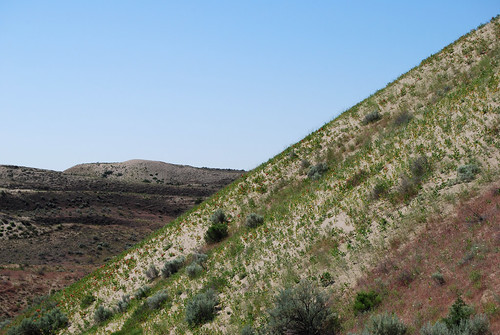

Juniper Dunes Wilderness is a big area of sand dunes northeast of the Tri-Cities. It's also the northernmost home of wild junipers in the U.S., hence its name. We didn't venture too far into the wilderness. We climbed the big hill/dune near the north entrance, walked around in a circle atop the hill/dune, and called it good. Why venture down into the low dunes when you can see it all from the top? True, we could still see farms and ranches to the north, but that's no problem.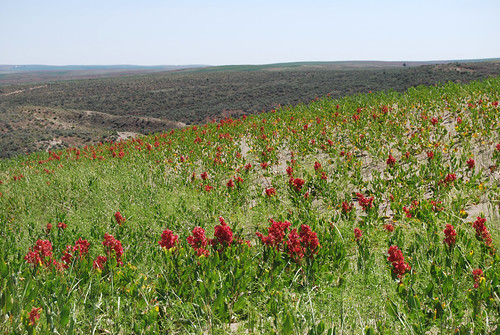
So then we headed across rural Franklin County toward Kahlotus, the "hole in the ground" at the start of Highway 21.
The highway had a constant supply of little birds sitting on it. I never hit one -- they always flew away in time -- but several gave me a scare. Were they sunning themselves on the hot asphalt like lizards? Or was the road the only place they felt safe from predators?
We stopped in Odessa for lunch.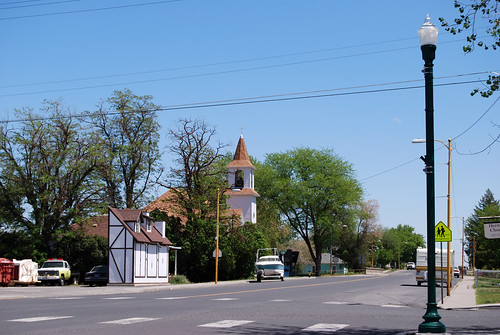
Not the Odessa in Ukraine nor Texas, by the way.
One from the outskirts of Wilbur:
It was a bit odd to come across US 2 way out in the middle of the state. We'd driven through Wilbur in February 2008 without stopping, and yet it was familiar. Back then, it was cold and foggy, though. Quite a difference.
Next up, the mighty Columbia River!
(Chunlin's photo above)
All the rivers we encountered on our trip (Yakima, Sanpoil, Kettle, Similkameen) were nearly overflowing their banks racing to get to the Columbia, and yet the water level on Roosevelt Lake (behind Grand Coulee Dam) was surprisingly low.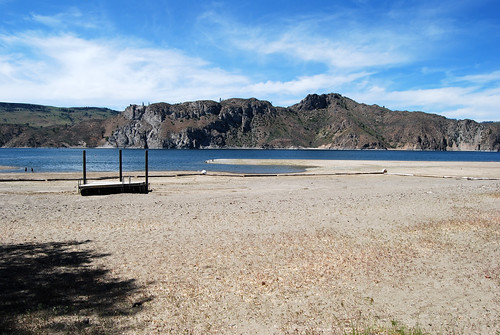
The log boom surrounding the swimming area at Keller Ferry Campground was high and dry. That was too much hot sand to cross for my liking, so instead of jumping in the lake, we rested at the picnic shelter and listened to the wind blow the trees.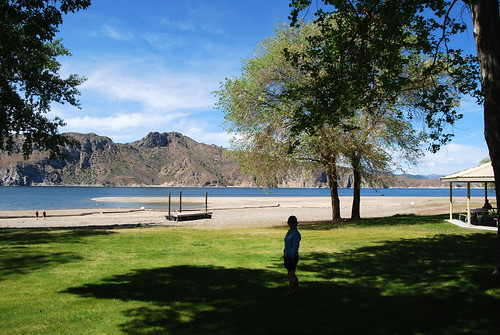

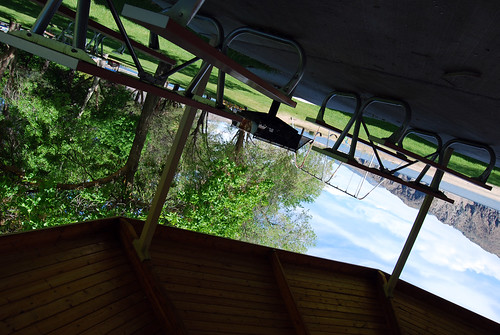
Eventually, we decided to hit the road . . . or more precisely, the ferryboat. There's no bridge across the river/lake here, just a ferry that's been going back and forth every day for fifty-some years. WSDOT is working on designing the replacement.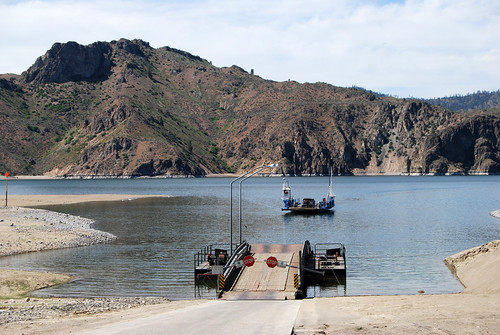
With the extreme changes in water level, I'd think designing a new dock will be the hard part.
As we boarded the little ferry, a deer ran down to the lake for a drink.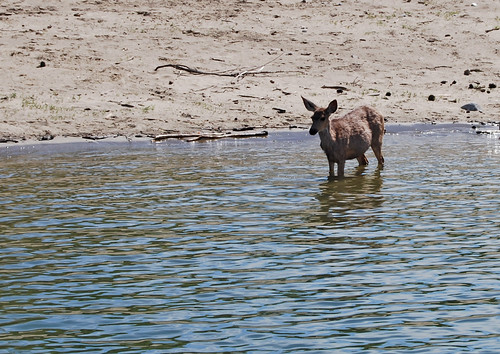
And away we go. . .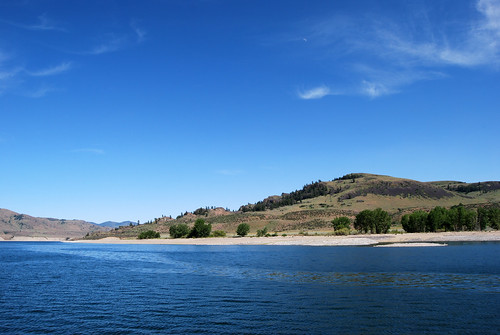
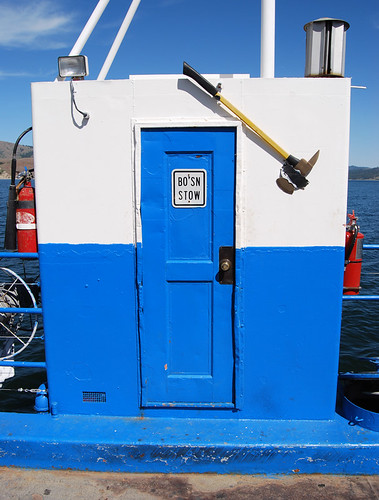
What's the typical abbreviation for boatswain, hm?
After dinner in Republic and lots of forest valley driving, we hit Canada.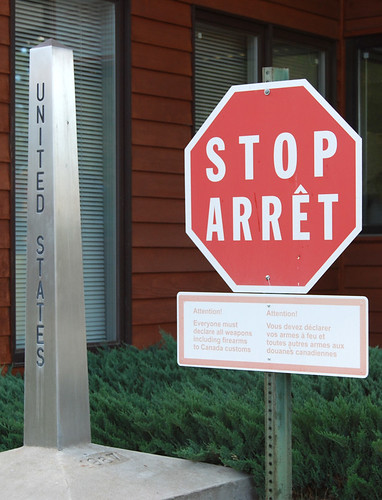
The Canadian border guard thought we were pretty suspicious, from what I gathered. We'd been to Canada a week earlier; it was seven o'clock in the evening; we didn't have a hotel reservation; we were from Seattle and crossing several hundred miles east; and Chunlin's passport still has her maiden name (the guard noticed our wedding rings). I think if I had told him at the beginning about driving the length of every Washington highway in numerical order, we might not have seemed so suspicious. Chunlin thought that would be too weird, though.
But let us in, he did. So off we drove to the west, on the Crowsnest Highway, toward Osoyoos (however you pronounce it). The last major mountain pass to the east of Osoyoos is not really a pass. If there wasn't an international border at 49°, the road would simply travel down a valley to the Okanogan River a couple miles south of Osoyoos. As it is, the Canadians had to enact a good chunk of engineering to get this road over the ridge. You'd think we could've sold them a few square miles for a good road. . .
By the time we got to Osoyoos and checked into a motel, the sun was setting.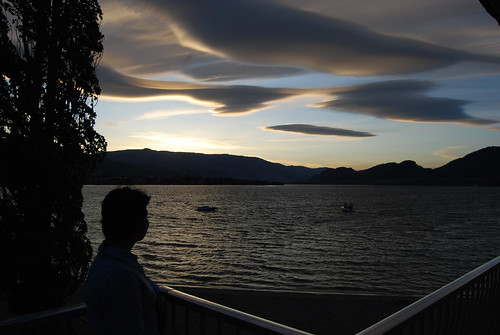
That's from our motel balcony, by the way.
After the Suze Orman Show and a good night's sleep, we took a walk along the lake.
A long drive through the mountains of British Columbia later, we arrived at Harrison Hot Springs for the second time in a week. Much more crowded than Monday, but just as windy.
We only had enough time to walk along the lakefront, exchange a Canada hockey jersey for a smaller size for Christina, have lunch, and then it was time to head for home.
The U.S. border guards gave us no trouble. We belonged in the U.S., after all. He did remind me that that was the last day I could use my driver's license and birth certificate to enter, however. I knew. It was part of the reason I wanted to get the drive done the last weekend in May. My passport application is now in the mail. Four to six weeks, they say.
. . . My car got a heck of a lot of mileage in May. Seattle to Burlington to Twisp to Republic to Colville to Newport to Spokane to Seattle to Burlington to Doe Bay to Friday Harbor to Mount Vernon to Seattle to Bellingham to Harrison Hot Springs to Bellingham to Seattle to Ellensburg to Sunnyside to Juniper Dunes to Odessa to Republic to Danville to Osoyoos to Harrison Hot Springs to Bellingham to Seattle!
Posted by Sotosoroto at 14:29 1 comments
Index: animals, canada, driving, hiking, home, photos, tv, washington
